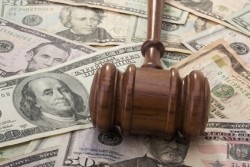 North Carolina healthcare company Carolinas Healthcare System (CHS) has agreed to pay $6.5 million to settle a whistleblower upcoding lawsuit consisting of allegations of False Claims Act (FCA) violations.
North Carolina healthcare company Carolinas Healthcare System (CHS) has agreed to pay $6.5 million to settle a whistleblower upcoding lawsuit consisting of allegations of False Claims Act (FCA) violations.
Along with the Charlotte Mecklenburg Hospital Authority, CHS has agreed to pay the whistleblower settlement to resolve the upcoding lawsuit. According to the whistleblower upcoding lawsuit, the government accused the healthcare facilities of “upcoding” claims for urination drug tests for the purpose of receiving higher compensation rates than what the tests actually cost.
According to a press release from the Department of Justice and attorneys involved in the whistleblower upcoding lawsuit, the settlement was announced June 30, 2017.
Overview of Whistleblower Upcoding Lawsuit
There are various government agencies involved in the whistleblower upcoding lawsuit including the North Carolina Attorney General, the U.S. Department of Health and Human Services, Office of Inspector General, and U.S. Attorney.
According to the whistleblower upcoding lawsuit, the government alleged CHS had been conducting urination drug tests and had categorized them as “moderate complexity” tests by the FDA between 2011 to 2015.
However during this time, CHS reportedly submitted claims that described the tests as “high complexity” by falsifying the codes identifying the tests.
These codes are automatically synced up with services provided, which triggers a designated payment. CHS had allegedly conducted this practice, to claim higher compensation rates than what the tests cost.
The government alleged CHS had submitted claims using code G0431, which is the code designated for high complexity tests by the FDA. The company was supposed to use the code G0434, which is the code for moderate complexity tests and generates payment of $20.
“As a result of CHS’s upcoding practices, the government alleges that federal health care programs paid CHS, and certain facilities under contract with CHS, approximately $80 more per test for the claims submitted with the higher paying code,” the Justice Department stated in its press release.
The whistleblower upcoding lawsuit was filed by former laboratory director for CHS, alleging various violations against the False Claims Act. According to the FCA, citizens can bring legal action on behalf of the federal government if they witness any fraud against the federal government.
After being made aware of this alleged fraud the government investigated and intervened, which eventually resulted in the whistleblower settlement. The laboratory director who reported the fraud will receive $1,365,000 as a whistleblower reward from the settlement.
“On June 30, 2017, Carolinas HealthCare System entered a civil settlement to resolve allegations in a lawsuit that, between 2011 and 2015 CHS billed the wrong code for drug screens reimbursed by Medicare and Medicaid. The lawsuit is not about our patient safety, quality of care, or whether the urine drug screen tests were done correctly,” CHS said in a statement.
“It is about the interpretation and application of complex and constantly changing billing guidelines,” according to a CHS statement. CHS has also promises to be compliant with Medicare and Medicaid standards, and claims that it plans to fully corporate with the federal government.
The total amount in the whistleblower settlement is $6.5 million, to resolve the allegations in the whistleblower upcoding lawsuit. The company has promised to pay the difference between what CHS received from FDA reimbursements and with what Medicare and Medicaid claims what CHS should have been compensated.
In general, whistleblower and qui tam lawsuits are filed individually by each plaintiff and are not class actions. Whistleblowers can only join this investigation if they are reporting fraud against the government, meaning that the government must be the victim, and that the alleged fraud should be a substantial loss of money.
Do YOU have a legal claim? Fill out the form on this page now for a free, immediate, and confidential case evaluation. The attorneys who work with Top Class Actions will contact you if you qualify to let you know if an individual qui tam lawsuit or whistleblower class action lawsuit is best for you. Hurry — statutes of limitations may apply.
ATTORNEY ADVERTISING
Top Class Actions is a Proud Member of the American Bar Association
LEGAL INFORMATION IS NOT LEGAL ADVICE
Top Class Actions Legal Statement
©2008 – 2026 Top Class Actions® LLC
Various Trademarks held by their respective owners
This website is not intended for viewing or usage by European Union citizens.
Get Help – It’s Free
Join a Free Whistleblower, Qui Tam Lawsuit Investigation
If you believe that you have witnessed fraud committed against the government, you may have a legal claim. Whistleblowers can only join this investigation if they are reporting fraud against the government, meaning that the government must be the victim, and that the alleged fraud should be a substantial loss of money.
See if you qualify to pursue compensation and join a whistleblower lawsuit investigation by submitting your information for a free case evaluation.
An attorney will contact you if you qualify to discuss the details of your potential case.
Please Note: If you want to participate in this investigation, it is imperative that you reply to the law firm if they call or email you. Failing to do so may result in you not getting signed up as a client, if you qualify, or getting you dropped as a client.
Oops! We could not locate your form.












